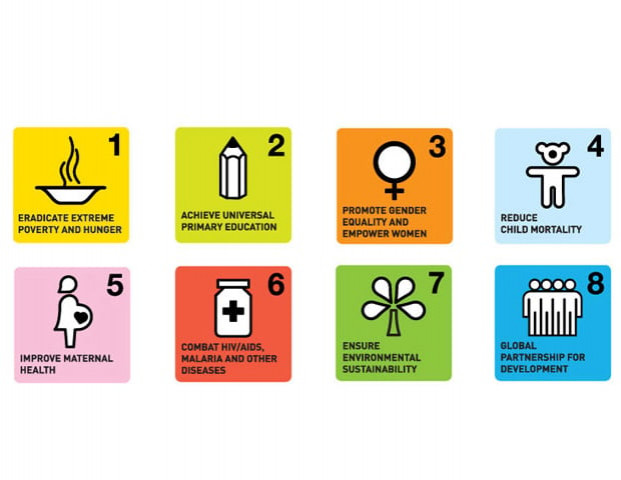Lagging behind: Pakistan off-track on Millennium Development Goals
Struggling to meet over 30 indicators under MDGs, on track to attain only 10 by 2015.

Struggling to meet over 30 indicators under MDGs, on track to attain only 10 by 2015. PHOTO: UN.ORG
The MDGs are eight international development goals that were established in 2000 by UN and its member states for completion by 2015. These goals, comprising social and health issues, have been further divided into over 60 indicators, of which Pakistan had pledged to 41. However, Pakistan aims to achieve only nine, missing out on over 30 key indicators focusing on health, debt services, education and living standards.

Planning and Development Minister Ahsan Iqbal blamed economic conditions for the poor performance.
“Reasons for missing most of the indicators include internal and external economic and non-economic challenges,” Iqbal conceded in a written reply to the Senate.
The minister pointed out natural disasters, conflicts, administrative and political changes, weak commitments to economic reforms, lack of awareness, fading commitments by development partners due to global recession of 2007 and belated ownership of MDG agenda at the sub-national level, as reasons for failure.
“Impact of these challenges reflected in slow progress and hence non-achievement of many of the indicators,” he added.
Muttahida Qaumi Movement Senator Tahir Mashadi had expressed doubt over whether Pakistan will be able to achieve the targets pledged under the MDGs by the 2015 deadline.

The government, in its reply, stated that it was working to enhance the capacity of the people through human resource development which involved better education, health, population welfare, skill development services, improved access to clean water and sanitation, and gender mainstreaming initiatives.
The minister also counted steps like provision of productive assets, inclusion of micro finance and transitioning toward social safety net to protect those against natural and manmade disasters.
Iqbal also highlighted that the poverty headcount had declined significantly under the Pakistan Living Standards Measurement survey data – from 34.5% in 2001-02 to 12.4% in 2010-11.

Findings of the United Nations Development Programme (UNDP) revealed that Punjab, in lieu of its performance in most indicators, is far ahead in achieving the MDGs as compared to other provinces. The findings also stated that no MDG will be achieved in entirety in Sindh, but that the province had made significant progress in certain indicators such as ‘ensuring environmental sustainability’ (MDG 7)
and ‘promoting gender equality and women empowerment’ (MDG 3).
Meanwhile, according to the findings, Khyber-Pakhtunkhwa had made significant progress in MDG 7 which reflected in its achievement of forest cover and protection of land area for conservation of wildlife. Progress in other MDG areas, however has suffered in part owing to the unprecedented natural as well as manmade calamities which have afflicted the province.
Balochistan is the worst performing province in most if not all areas of the MDGs. No MDG can be achieved in entirety in the province and in the aftermath of the floods, and the declining national economic, even the achievements made so far in a few indicators are at risk of being undone, the UNDP report stated.
Published in The Express Tribune, January 9th, 2014.


1724319076-0/Untitled-design-(5)1724319076-0-208x130.webp)
















COMMENTS
Comments are moderated and generally will be posted if they are on-topic and not abusive.
For more information, please see our Comments FAQ